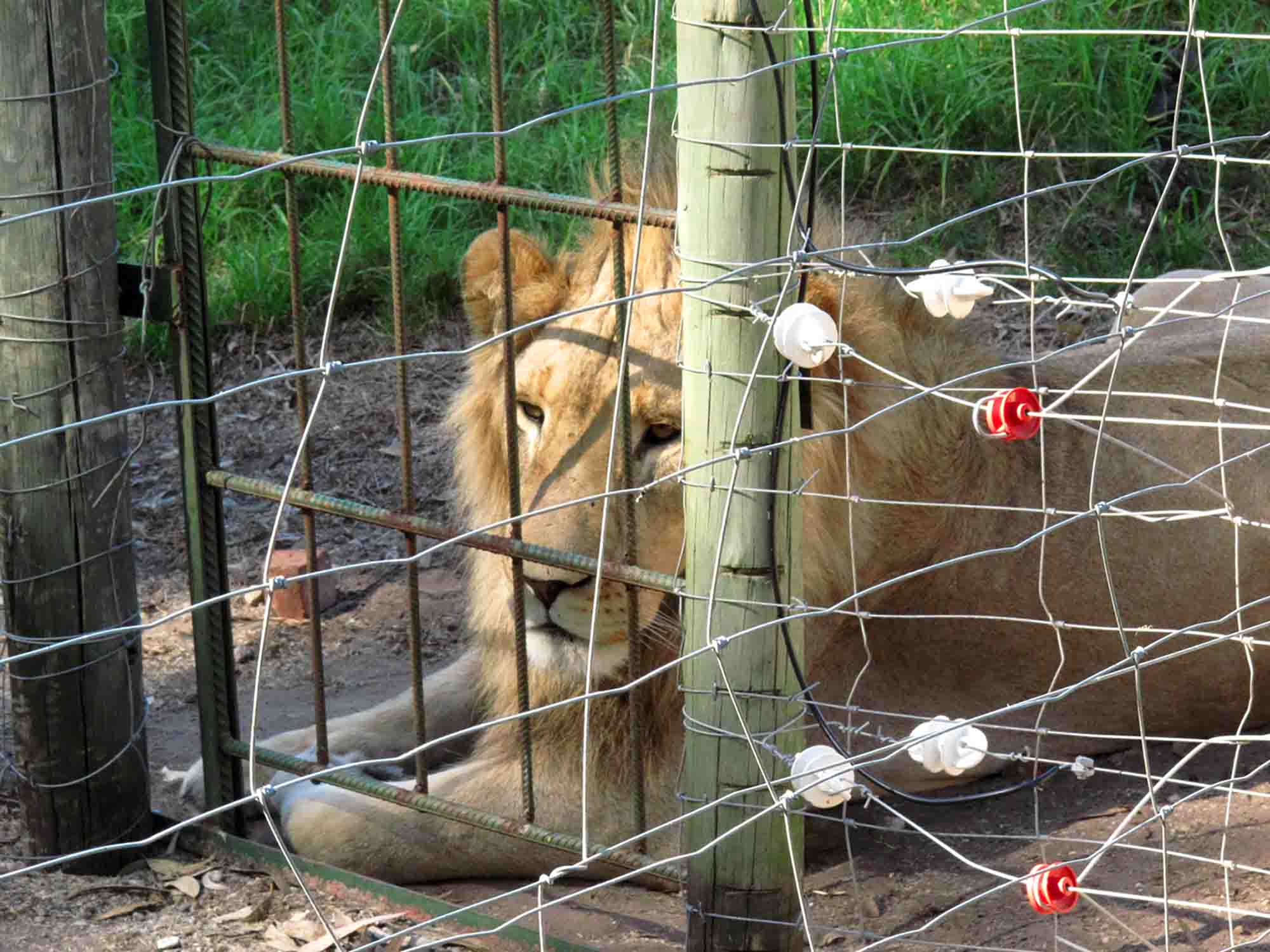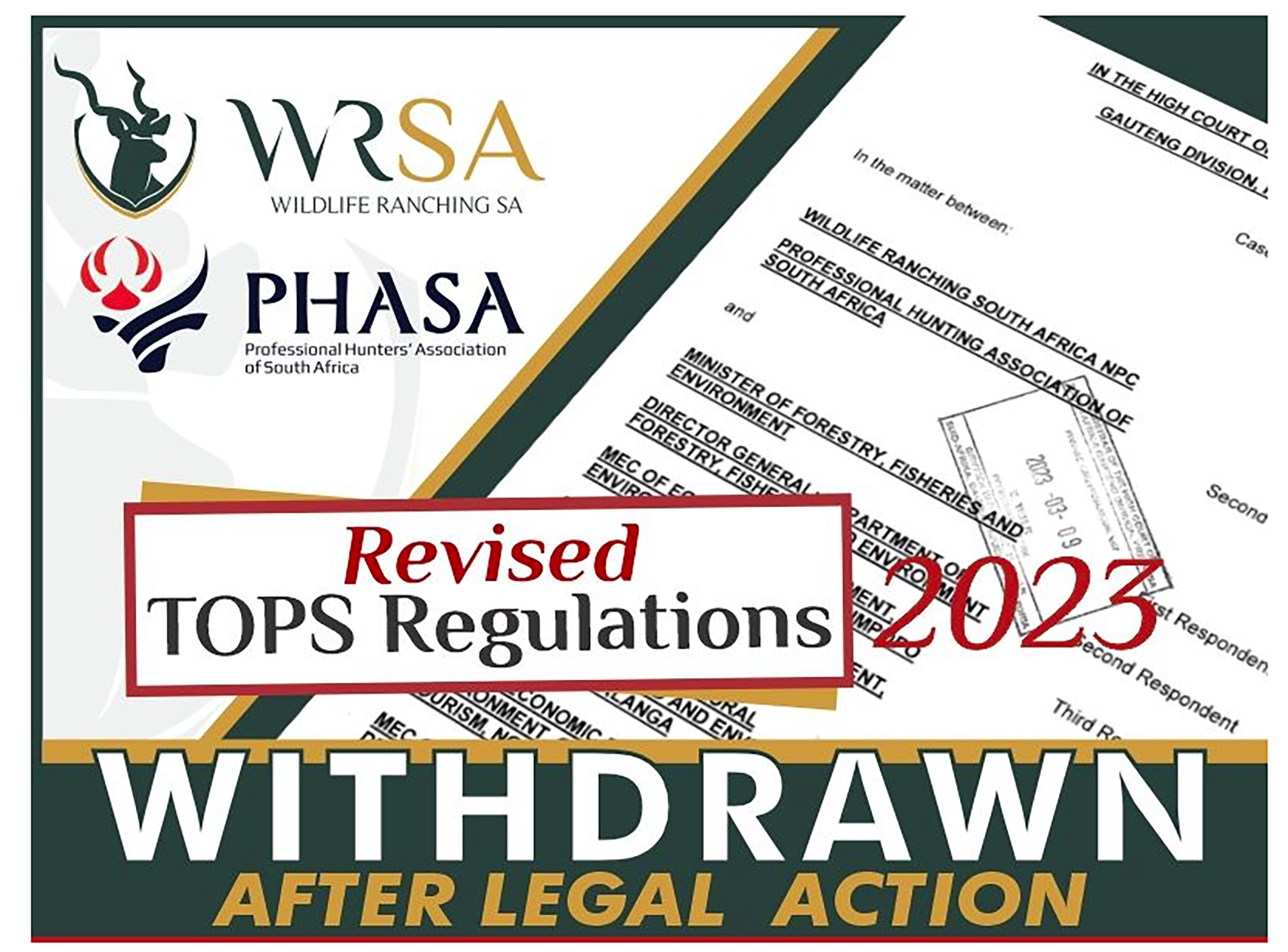The Department of Environment (DFFE) had gazetted the most progressive wildlife protection legislation ever drafted in South Africa. It seemed like good news for beleaguered wildlife.
But just before it was to become law, game breeder and hunter organisations applied for an urgent interdict to halt it. DFFE responded with a convincingly argued defence of its legislation, clearly indicating its strong opposition to the application, not least on the grounds that it was not urgent.
But at the last minute, in a secret, out-of-court settlement, the Department withdrew the proposed Threatened or Protected Species (TOPS) regulations as well as related Norms and Standards amendments and agreed to pay the applicants’ legal costs.
Its reasoning? “Due to the urgent timeframes of the litigation, the Department required additional time to consider the varied issues raised in the court application” by Wildlife Ranching South Africa (WRSA) and the Professional Hunters Association of South Africa (PHASA). So was it urgent or wasn’t it?
What’s curious is exactly what happened between 24 March, when the Department filed its comprehensive and well argued 91-page affidavit opposing the interdict, and 27 March when it completely backtracked in conceding to retract the regulations without revealing any of its arguments.
Because the TOPS regulations were closely interlinked to four other Government Notices – also due to come into effect on 1 April – DFFE has also withdrawn the revised Norms and Standards for the management of elephants, the hunting of leopards, the amended protection list of 266 wild mammal, fish, birds, invertebrates and plants and new regulations involving the trade in rhino horn.
What were the seemingly convincing arguments made by WRSA/PHASA that made the DFFE back off? What other agreements or aspects to the settlement were reached? And why and on what basis did DFFE agree to pay costs when, in such cases, each party normally pays them? At this stage nobody’s talking and a request to DFFE by Our Burning Planet got no reply.
Consultation timeframes
The TOPS regulations were published on 3 February for public comment before being promulgated, and at that point WRSA and PHASA met with the Department. Were their concerns raised then? What prompted them to take the Department to court?
Explaining the court challenge, the CEO of PHASA, Dries van Coller, said the publication of the TOPS regulations and species list had taken the industry by surprise because the previous very limited public participation process was eight years ago in 2015.
“The Minister’s promulgated version of the regulations differed materially from the previous versions and included numerous provisions which would be detrimental to the ability of game ranchers and professional hunters to conduct sustainable business in the game industry.”
Van Coller had grounds for complaint. Very limited public participation followed the publication of the TOPS regulations. This is in contrast to the exhaustive consultation following the recommendations of the High Level Panel on lions, rhinos, elephants and leopards and also the White Paper on Biodiversity just approved by Cabinet.
It is also surprising that the minister’s legal advisers appear to have failed to take note of the precedent affirmed for the requirements for public participation in two other cases. One was an interim interdict granted to the Humane Society International-Africa which challenged the hunting and export quotas for elephants, rhinos and leopards. The second judgement was obtained by Endangered Wildlife Trust overturning the Department of Agriculture’s inclusion of several species of wild animals under the Animal Improvement Act.
More than time frames
A reading of the TOPS regulations, however, makes it clear why game farmers and hunters hit the panic button. It’s not just about consultation time frames. Following the report of the High Level Panel, DFFE’s Cabinet-approved proposals on animal wellbeing and the White Paper on Biodiversity just published, it’s clear that Creecy is responsive to increasing reports and studies on cruelty on game farms and, particularly, the hunting of lions bred for the bullet.
 A lion in a breeding facility. (Photo: Conservation Action Trust)
A lion in a breeding facility. (Photo: Conservation Action Trust)
All this is having a negative effect on South Africa’s image abroad at a time when the country desperately needs to rebuild its tourist industry after the Covid pandemic.
The new TOPS regulations tighten the thumbscrews on sloppy, inappropriate, dangerous and cruel game farming and hunting in an industry that has mostly been at great pains to fly below the radar. They considerably tighten regulation of captive breeding, rehabilitation, temporary holding and commercial exhibition facilities, game farms and animal translocators.
But the regulations go much further, listing 266 species as vulnerable, endangered, or critically endangered with precise listing of restricted or prohibited activities with regard to each. These include all rhino species, elephants, lions, leopards, African wild dogs, cheetahs, hyenas and a range of plains game including southern roan and sable antelope and both species of zebra.
TOPS also tightens regulations around hunting permits and drills down on captive breeding, which must have infuriated breeders and would have been the main points of contention in the court case. A huge bone of contention with facilities involved in so-called canned hunting, where hand-reared lions are released to be shot, would have been regulations prohibiting the hunting of a large predator in an area adjacent to a captive holding facility.
Also prohibited would be the introduction of wild-caught predators to breeding facilities, a time limit after which rehabilitation facilities would have to return animals to the wild, and a ban on breeding in sanctuaries.
The TOPS regulations put captive breeding facilities under an official microscope with the ability to close them down for non-compliance with the strict guidelines. All animals and the conditions under which they are kept would have to be documented for official inspection and stud books kept to curb inbreeding and hybridisation.
Enclosures would need to comply with regulations, the food supply for captive animals detailed, plans provided for the removal of waste and the availability of veterinary services. Captive breeding facilities would be required to provide a description of the strategies used in breeding that contribute to the conservation of wild populations, a requirement that lion farms would find impossible.
Breeding facilities would be denied registration if their activities conflicted with the Biodiversity Act or with anything within the TOPS regulations. And to add to the uncertainty of game breeders, their registration could be cancelled if “there is a change in the conservation status of the species involved being bred, reared, propagated, traded or kept by a permit holder”.
A question of capacity
A weakness of the TOPS regulations – and this would have been pointed out in the court case – is that the tight control required by DFFE would require far more trained officials and a data collection system capable of responding quickly and efficiently. Sadly, neither national or provincial environmental departments have either of these. This point was hammered home by Dries van Coller of PHASA:
“We are already being hamstrung by the inability of various national and provincial departments to administrate the myriad of environmental regulations. State departments already do not have the capacity or funding to administer the wildlife industry properly.
“We receive complaints from members on a near-daily basis of permits not being processed. There is simply no money in some provinces to cover the costs associated with statutory oversight work. The system is stalling due to the department not having enough people and money to do their job. Now we see a Minister who wants to impose even more conditions on an already over-regulated industry.”
So here’s the question. Will the TOPS regulations and linked wildlife laws be scrapped, rewritten or hit a new round of contestation? No time frame or way forward has yet been suggested. For now the issue lies smouldering in a firepit of confusion. OBP




 A lion in a breeding facility. (Photo: Conservation Action Trust)
A lion in a breeding facility. (Photo: Conservation Action Trust) 